Fleet Management Software Development: Development, Challenges, and Tech Stack
The transportation and logistics industry is undergoing a digital transformation, with fleet management software development at the forefront of this revolution. As businesses increasingly rely on efficient fleet operations to maintain a competitive advantage, the demand for sophisticated fleet management software solutions continues to surge. This comprehensive guide explores everything you need to know about fleet management software development services, from market insights to technical implementation of custom fleet management software.
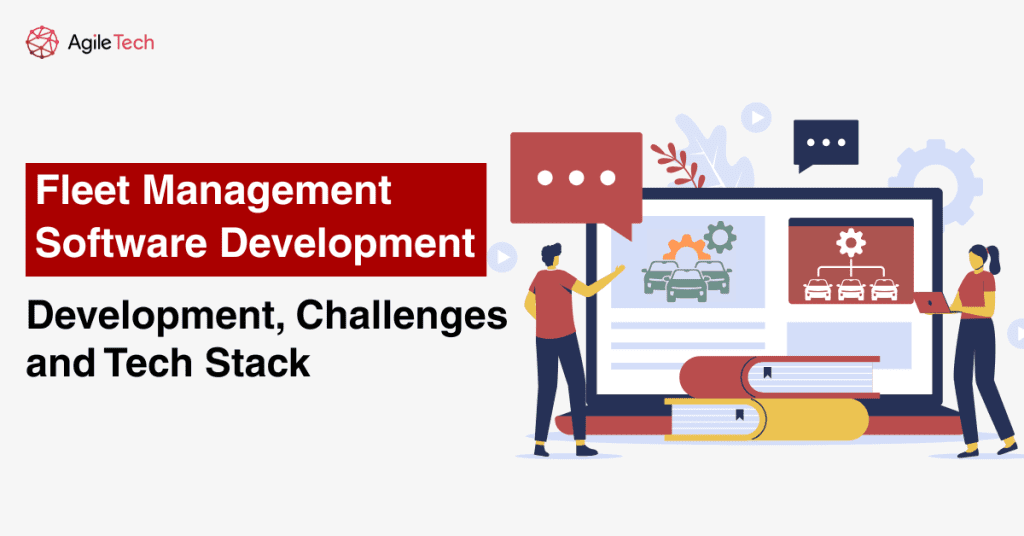
- 1. What Is Fleet Management Software
- 2. Different Types of Fleet Management Software
- 3. Fleet Management Software Development: Core Features
- 4. Software Architecture
- 5. Fleet Management Software Development Process
- 6. Major Technical Barriers
- 7. Advanced Technologies
- 8. Top 5 Fleet Management Software
- AgileTech Fleet Management Development Expertise
- Conclusion
1. What Is Fleet Management Software
Fleet management software is a comprehensive digital solution designed to help businesses monitor, manage, and optimize their vehicle operations. These fleet management programs integrate various technologies, including GPS tracking, telematics, mobile applications, and cloud computing, to provide real-time visibility into fleet performance, driver behavior, vehicle maintenance, and operational efficiency.
Leading fleet management software development companies focus on creating solutions that address the complex needs of modern transportation businesses, offering both off-the-shelf and custom fleet management software options.
1.1. Market Overview and Growth Trajectory
The global fleet management market has experienced remarkable growth, expanding from approximately $22 billion in recent years to a projected $34 billion by 2025. This substantial growth reflects the increasing adoption of connected vehicle technologies, rising fuel costs, stringent government regulations, and the growing need for operational efficiency across industries.
Several factors drive this market expansion:
Digital Transformation: Companies across industries are embracing digital solutions to streamline operations and reduce costs. Fleet management software development represents a critical component of this transformation, offering data-driven insights that were previously unavailable through traditional fleet software management approaches.
Environmental Regulations: Governments worldwide are implementing stricter emissions standards and environmental regulations, pushing companies to adopt more efficient fleet management programs. Software solutions help organizations monitor fuel consumption, optimize routes, and reduce their carbon footprint.
Economic Pressures: Rising fuel costs, insurance premiums, and maintenance expenses compel businesses to seek more efficient ways to manage their fleets. Modern fleet management software provides the tools necessary to control these costs through better planning and optimization.
1.2. Business Problems Solved
Fleet management software addresses numerous operational challenges that organizations face when managing vehicle fleets. These solutions eliminate inefficiencies that can significantly impact profitability and operational effectiveness.
Cost Control and Optimization: One of the primary benefits of fleet management software solutions is comprehensive cost management. The software tracks fuel consumption, maintenance expenses, driver performance, and vehicle utilization, providing managers with detailed insights into where money is being spent and where savings can be achieved.
Compliance Management: Modern transportation is heavily regulated, with requirements for electronic logging devices (ELDs), hours of service compliance, and safety regulations. Fleet management software development services focus on automating compliance reporting and ensuring adherence to regulatory requirements, reducing the risk of fines and penalties.
Operational Efficiency: These fleet management programs optimize route planning, reduce idle time, improve driver productivity, and enhance overall fleet utilization. By providing real-time data and analytics, managers can make informed decisions that improve operational efficiency.
Safety and Risk Management: Custom fleet management software monitors driver behavior, tracks vehicle maintenance schedules, and provides alerts for potential safety issues. This proactive approach helps reduce accidents, lower insurance costs, and protect both drivers and company assets.
2. Different Types of Fleet Management Software
The fleet management software development landscape encompasses various specialized solutions, each designed to address specific operational needs. Understanding these different types of fleet software management helps organizations select the most appropriate solution for their requirements, whether they need comprehensive fleet management programs or specialized custom fleet management software.
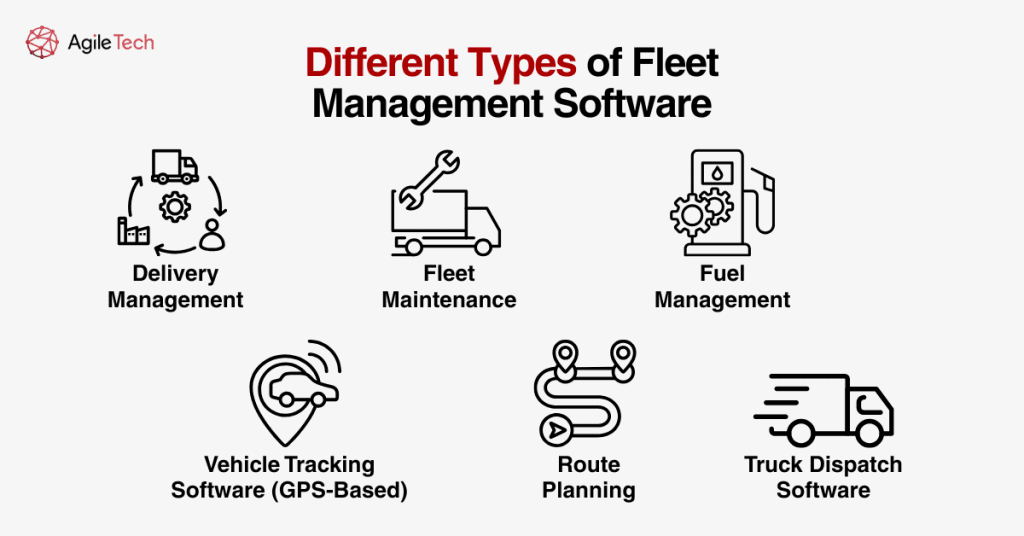
2.1. Delivery Management
Delivery management software focuses specifically on optimizing last-mile delivery operations. These fleet management software solutions are particularly crucial for e-commerce companies, food delivery services, and logistics providers who need to ensure the timely and efficient delivery of goods to customers.
Key capabilities include customer communication tools, proof of delivery systems, delivery scheduling and routing, real-time delivery tracking, and performance analytics. These fleet management programs often integrate with customer relationship management (CRM) platforms and inventory management systems to provide a comprehensive delivery ecosystem.
The software helps businesses reduce delivery times, improve customer satisfaction, optimize delivery routes, and manage delivery personnel effectively. Advanced delivery management solutions also incorporate machine learning algorithms to predict delivery times and optimize routes based on historical data and real-time conditions. Many fleet management software development companies specialize in creating these tailored delivery solutions.
2.2. Fleet Maintenance
Fleet maintenance software specializes in managing the maintenance and repair aspects of fleet operations. These fleet software management solutions help organizations maintain their vehicles in optimal condition, reduce unexpected breakdowns, and extend vehicle lifespan.
Core features include preventive maintenance scheduling, maintenance history tracking, parts inventory management, work order management, and vendor coordination. The software typically integrates with vehicle diagnostic systems to provide real-time health monitoring and predictive maintenance capabilities.
By implementing fleet maintenance software through professional fleet management software development services, organizations can reduce maintenance costs, minimize vehicle downtime, improve safety, and ensure regulatory compliance. The predictive analytics capabilities help identify potential issues before they become major problems, allowing for proactive maintenance strategies.
2.3. Fuel Management
Fuel management software addresses one of the largest operational expenses for most fleets. These specialized fleet management software solutions monitor fuel consumption, identify inefficiencies, and provide tools to optimize fuel usage across the entire fleet.
Essential features include fuel consumption tracking, fuel card integration, fuel theft detection, driver behavior monitoring for fuel efficiency, and fuel cost analysis. Advanced fleet management programs also provide benchmarking capabilities and fuel efficiency recommendations.
The software helps organizations reduce fuel costs, identify and prevent fuel theft, improve driver behavior, and optimize routes for better fuel efficiency. Integration with telematics systems provides comprehensive insights into factors affecting fuel consumption. Custom fleet management software development allows for specific fuel management features tailored to industry requirements.
2.4. Vehicle Tracking Software (GPS-Based)
GPS-based vehicle tracking software provides real-time location monitoring and historical tracking data for fleet vehicles. This type of fleet software management forms the foundation for many other fleet management capabilities and is essential for comprehensive fleet management programs.
Primary features include real-time vehicle location tracking, geofencing capabilities, historical route playback, speed monitoring, and unauthorized usage alerts. These fleet management software solutions typically offer mobile applications for drivers and web-based dashboards for fleet managers.
Vehicle tracking software enhances security, improves customer service through accurate arrival times, enables efficient dispatching, and provides accountability for vehicle usage. The data collected also supports insurance claims and helps recover stolen vehicles. Professional fleet management software development ensures these tracking systems meet industry standards and compliance requirements.
Read more: GPS Fleet Management System Improved Petroleum Truck Tracking by 65%
2.5. Route Planning
Route planning software optimizes vehicle routes to minimize travel time, reduce fuel consumption, and improve overall efficiency. These fleet management software solutions are particularly valuable for businesses with multiple stops or complex delivery schedules.
Key capabilities include multi-stop route optimization, real-time traffic integration, driver skill and vehicle constraint consideration, dynamic route adjustment, and load planning optimization. Advanced fleet management programs incorporate artificial intelligence to continuously improve routing decisions based on historical performance data.
Effective route planning software can significantly reduce operational costs, improve customer satisfaction through more reliable service, reduce driver fatigue, and lower environmental impact through reduced emissions. Fleet management software development companies often specialize in creating sophisticated routing algorithms tailored to specific industry needs.
2.6. Truck Dispatch Software
Truck dispatch software streamlines the coordination and management of trucking operations, particularly important for transportation and logistics companies. These fleet software management solutions help dispatchers efficiently assign loads, manage driver schedules, and coordinate complex logistics operations.
Core features include load assignment and optimization, driver availability tracking, communication tools, document management, and billing integration. The software often integrates with load boards and transportation management systems to provide comprehensive operational support through specialized fleet management programs.
Benefits include improved operational efficiency, better resource utilization, enhanced communication between dispatchers and drivers, and streamlined administrative processes. The software helps reduce empty miles and improve overall fleet productivity. Custom fleet management software development allows for dispatch solutions tailored to specific operational requirements.
Read more: Trucking Dispatch Software: Key Features and Real Benefits
3. Fleet Management Software Development: Core Features
Developing effective fleet management software requires implementing a comprehensive set of core features that address the diverse needs of fleet operations. These features form the foundation of any successful fleet management software solution and are typically included in professional fleet management software development services.
3.1. GPS Tracking
GPS tracking represents the cornerstone of modern fleet management software development. This feature provides real-time location data for all vehicles in the fleet, enabling managers to monitor vehicle movements, optimize operations, and ensure security through comprehensive fleet software management.
Advanced GPS tracking implementations in fleet management programs go beyond basic location services to include speed monitoring, route deviation alerts, geofencing capabilities, and historical tracking data. The system must handle high-frequency location updates while maintaining accuracy and reliability across diverse geographic conditions.
Technical considerations include selecting appropriate GPS hardware, implementing efficient data transmission protocols, handling connectivity issues in remote areas, and ensuring data accuracy. The software must also provide intuitive mapping interfaces and customizable alerting systems. Professional fleet management software development companies ensure these tracking systems meet enterprise-grade requirements.
3.2. Route Optimization
Route optimization algorithms represent one of the most complex and valuable features in fleet management software development. These fleet management software solutions must consider multiple variables, including traffic conditions, vehicle capacity, driver schedules, delivery windows, and customer preferences.
Effective route optimization requires sophisticated algorithms that can process large amounts of data quickly and provide optimal solutions. Machine learning capabilities enable fleet management programs to improve recommendations based on historical performance and changing conditions.
Implementation challenges include handling real-time traffic data, managing complex constraint sets, scaling algorithms for large fleets, and providing user-friendly interfaces for route modification. The system must also integrate with navigation systems and mobile applications for driver guidance. Custom fleet management software development allows for optimization algorithms tailored to specific business requirements.
3.3. Driver Management
Comprehensive driver management features help organizations monitor driver performance, ensure compliance, and improve safety outcomes through advanced fleet software management. These capabilities extend beyond basic tracking to include behavior analysis, training management, and performance optimization in modern fleet management programs.
Key components include driver behavior monitoring, hours of service tracking, performance scoring and analytics, training and certification management, and communication tools. The system must balance monitoring requirements with driver privacy concerns and provide constructive feedback mechanisms.
Technical implementation involves integrating with vehicle sensors, processing behavioral data, generating meaningful analytics, and providing mobile interfaces for drivers. The fleet management software solutions must also support various compliance requirements and reporting standards. Fleet management software development services ensure these features meet regulatory requirements while maintaining user-friendly interfaces.
3.4. Fuel Monitoring
Fuel monitoring capabilities provide detailed insights into fuel consumption patterns, efficiency metrics, and cost optimization opportunities through comprehensive fleet software management. These features help organizations identify waste, prevent theft, and improve overall fuel efficiency in their fleet management programs.
Advanced fuel monitoring includes consumption tracking and analysis, fuel card integration, theft detection algorithms, efficiency benchmarking, and cost forecasting. The fleet management software solutions must integrate with various fuel management systems and provide actionable insights for improvement.
Implementation requires integration with vehicle systems, fuel card providers, and financial systems. The software must handle different fuel types, pricing structures, and reporting requirements while providing real-time alerts and comprehensive analytics. Fleet management software development companies specialize in creating these integrated fuel monitoring solutions.
3.5. Maintenance
Preventive maintenance management helps organizations maintain vehicle reliability, reduce unexpected breakdowns, and optimize maintenance costs through effective fleet software management. These features require integration with vehicle diagnostic systems and maintenance management processes in comprehensive fleet management programs.
Core maintenance features include scheduled maintenance tracking, diagnostic data integration, work order management, parts inventory tracking, and vendor coordination. The fleet management software solutions must support various maintenance strategies and provide predictive analytics capabilities.
Technical challenges include integrating with diverse vehicle systems, managing complex maintenance schedules, handling parts inventory, and providing mobile access for technicians. The software must also support various maintenance standards and reporting requirements. Custom fleet management software development allows for maintenance features tailored to specific fleet types and operational requirements.
3.6. Analytics and Reporting
Comprehensive analytics and reporting capabilities transform raw fleet data into actionable business insights through advanced fleet software management. These features must accommodate diverse reporting needs while providing both standard and customizable report options in modern fleet management programs.
Essential analytics include performance dashboards, key performance indicators (KPI) tracking, trend analysis, comparative reporting, and predictive analytics. The fleet management software solutions must handle large data volumes and provide real-time and historical reporting capabilities.
Implementation requires robust data processing capabilities, flexible reporting engines, visualization tools, and export functionality. The software must also support various data formats and integration with business intelligence systems. Fleet management software development services focus on creating analytics platforms that provide meaningful insights for decision-making.
3.7. ELD Compliance
Electronic Logging Device (ELD) compliance features ensure adherence to regulatory requirements for commercial vehicle operations through specialized fleet software management. These capabilities must meet specific regulatory standards while providing user-friendly interfaces for drivers and managers in comprehensive fleet management programs.
Key ELD features include hours of service tracking, duty status management, vehicle inspection reports, driver vehicle inspection reports (DVIR), and regulatory reporting. The fleet management software solutions must comply with specific technical standards and provide audit trails.
Technical requirements include certified hardware integration, secure data storage, regulatory reporting formats, and tamper-resistant logging capabilities. The software must also provide driver interfaces and support various enforcement scenarios. Fleet management software development companies must ensure ELD compliance features meet all regulatory requirements and certification standards.
Read more: Top 5 Essential Features of a Fleet Management Software for Efficient Operations
4. Software Architecture
Cloud Infrastructure: Modern fleet management software leverages cloud computing for scalability, reliability, and global accessibility. Cloud architectures support real-time data processing, storage, and analytics while reducing infrastructure costs.
Internet of Things (IoT) Integration: IoT connectivity enables seamless communication between vehicles, hardware devices, and software systems. This integration supports real-time monitoring and control capabilities.
Mobile Applications: Native mobile applications for both iOS and Android platforms provide drivers and managers with mobile access to essential features. These applications must work reliably in challenging connectivity conditions.
Artificial Intelligence and Machine Learning: AI/ML capabilities enable predictive analytics, intelligent routing, automated insights, and continuous system optimization. These technologies help transform raw data into actionable business intelligence.
5. Fleet Management Software Development Process
Developing successful fleet management software requires a structured approach that encompasses requirements gathering, vendor selection, design, development, and ongoing maintenance.
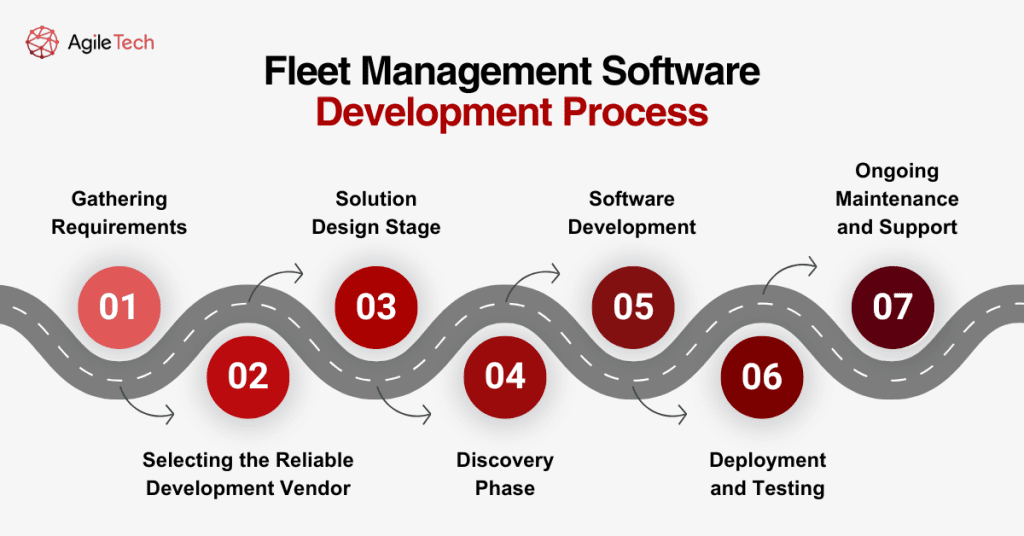
Step 1. Gathering Requirements
The requirements gathering phase establishes the foundation for successful software development. This process involves comprehensive stakeholder interviews, business process analysis, technical requirement definition, and compliance assessment.
Effective requirements gathering includes identifying key stakeholders, documenting current processes, defining desired outcomes, establishing technical constraints, and prioritizing features. The process must also consider scalability requirements, integration needs, and regulatory compliance.
Step 2. Selecting the Reliable Development Vendor
Vendor selection significantly impacts project success and requires careful evaluation of technical capabilities, industry experience, development methodologies, and ongoing support capabilities.
Key evaluation criteria include technical expertise in fleet management solutions, proven track record with similar projects, development team qualifications, project management capabilities, and post-launch support services. The selection process should also consider cultural fit and communication capabilities.
Step 3. Solution Design Stage
The design stage transforms requirements into detailed technical specifications and user experience designs. This phase includes system architecture design, database modeling, user interface design, and integration planning.
Effective design considers scalability requirements, security needs, user experience optimization, and technical feasibility. The design must also accommodate future enhancements and integration requirements.
Step 4. Discovery Phase
The discovery phase involves detailed technical analysis, proof of concept development, risk assessment, and project planning refinement. This phase helps validate technical approaches and identify potential challenges.
Discovery activities include technical feasibility studies, prototype development, third-party integration testing, and detailed project timeline development. The phase should also include risk mitigation planning and resource allocation.
Step 5. Software Development
The development phase implements the designed solution using appropriate development methodologies, quality assurance processes, and project management practices. This phase requires careful coordination between development teams, stakeholders, and testing resources.
Development best practices include agile methodologies, continuous integration, automated testing, code review processes, and regular stakeholder communication. The development process must also incorporate security testing and performance optimization.
Step 6. Deployment and Testing
Deployment and testing ensure the software meets requirements and performs reliably in production environments. This phase includes comprehensive testing, deployment planning, user training, and go-live support.
Testing activities include functional testing, performance testing, security testing, integration testing, and user acceptance testing. Deployment planning must consider data migration, system integration, and user transition strategies.
Step 7. Ongoing Maintenance and Support
Ongoing maintenance and support ensure continued system reliability, security, and performance optimization. This phase includes bug fixes, feature enhancements, security updates, and technical support services.
Maintenance activities include system monitoring, performance optimization, security patching, user support, and continuous improvement initiatives. The maintenance strategy must also consider technology evolution and changing business requirements.
6. Major Technical Barriers
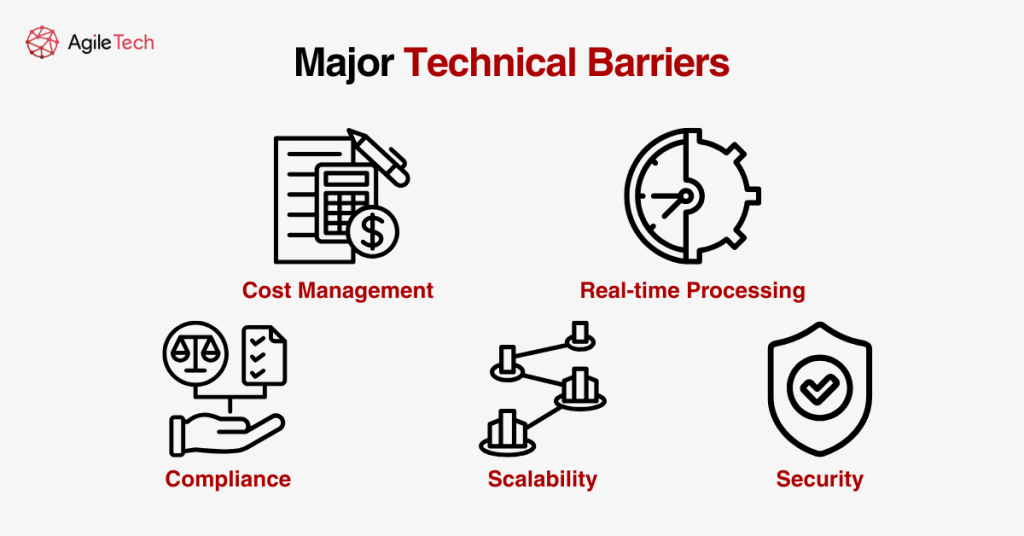
Fleet management software development faces several significant technical challenges that require careful consideration and expert solutions.
Cost Management: Balancing feature richness with development costs requires careful prioritization and efficient development practices. Organizations must consider both initial development costs and ongoing operational expenses.
Real-time Processing: Processing high-volume, real-time data from multiple vehicles requires robust infrastructure and efficient algorithms. The system must handle peak loads while maintaining performance and accuracy.
Compliance: Meeting various regulatory requirements across different jurisdictions requires a comprehensive understanding of compliance standards and flexible software architecture.
Scalability: Supporting growth from small fleets to enterprise-scale operations requires scalable architecture and efficient resource utilization. The software must handle increasing data volumes and user loads.
Security: Protecting sensitive fleet data, ensuring system integrity, and maintaining privacy requires comprehensive security measures and ongoing monitoring.
7. Advanced Technologies
7.1. AI/ML
Artificial Intelligence and Machine Learning technologies enable predictive analytics, intelligent automation, and continuous system optimization. These capabilities help transform fleet management from reactive to proactive operations.
AI/ML applications include predictive maintenance, intelligent routing, driver behavior analysis, fuel optimization, and automated reporting. These technologies require substantial data volumes and specialized expertise for effective implementation.
7.2. IoT Integration and Blockchain
Internet of Things integration enables comprehensive vehicle connectivity and real-time monitoring capabilities. Blockchain technology provides secure, transparent transaction recording and supply chain tracking.
IoT applications include sensor integration, real-time monitoring, automated reporting, and device management. Blockchain applications include secure transaction recording, supply chain transparency, and smart contract automation.
7.3. Autonomous Vehicle Readiness
Preparing fleet management software for autonomous vehicle integration requires consideration of new data types, control systems, and operational models. This preparation ensures software longevity and competitive advantage.
Autonomous vehicle considerations include new sensor data types, automated decision-making systems, remote monitoring capabilities, and regulatory compliance for autonomous operations.
| Category | Key Components | Benefits | Development Considerations |
| Market Overview | Global market: $22B → $34B by 2025 | Digital transformation opportunities | High growth potential, competitive landscape |
| Software Types | Delivery, Maintenance, Fuel, Tracking, Route Planning, Dispatch | Specialized solutions for specific needs | Custom vs. off-the-shelf considerations |
| Core Features | GPS Tracking, Route Optimization, Driver Management, Fuel Monitoring, Maintenance, Analytics, ELD Compliance | Comprehensive fleet visibility and control | Integration complexity, regulatory compliance |
| Technology Stack | GPS/Telematics Hardware, Cloud Infrastructure, IoT, Mobile Apps, AI/ML | Scalable, real-time processing capabilities | Hardware compatibility, data security |
| Development Process | 7-step process: Requirements → Vendor Selection → Design → Discovery → Development → Deployment → Maintenance | Structured approach ensures success | Timeline management, stakeholder alignment |
| Technical Barriers | Cost Management, Real-time Processing, Compliance, Scalability, Security | Critical challenges to address | Requires specialized expertise and planning |
| Advanced Technologies | AI/ML, IoT Integration, Blockchain, Autonomous Vehicle Readiness | Future-proofing and competitive advantage | Investment in emerging technologies |
| Market Leaders | Samsara, Fleetio, Onfleet, FleetFocus, Avrios | Established solutions and best practices | Competitive analysis and differentiation |
8. Top 5 Fleet Management Software
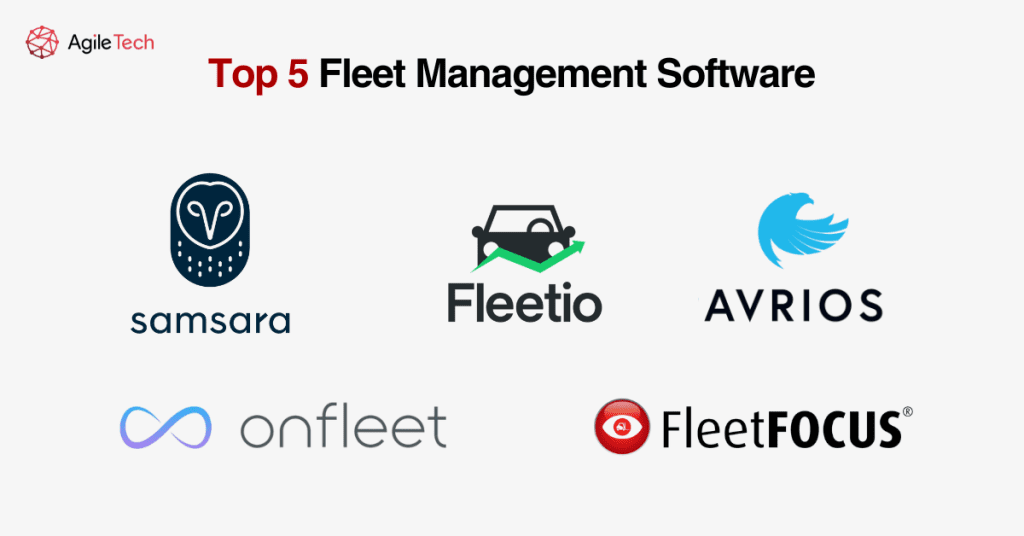
1. Samsara
Samsara provides comprehensive fleet management solutions with a strong emphasis on safety, compliance, and operational efficiency. The platform offers robust hardware integration and user-friendly interfaces.
2. Fleetio
Fleetio focuses on maintenance management with comprehensive vehicle lifecycle tracking, parts inventory management, and workflow automation capabilities.
3. Onfleet
Onfleet specializes in last-mile delivery optimization with advanced routing algorithms, customer communication tools, and delivery performance analytics.
4. FleetFocus
FleetFocus provides specialized solutions for specific industries with customizable features and comprehensive reporting capabilities.
5. Avrios
Avrios offers fleet management solutions with an emphasis on cost optimization, compliance management, and operational analytics.
AgileTech Fleet Management Development Expertise
AgileTech brings extensive experience in fleet management software development, combining technical expertise with deep industry knowledge. Our development approach emphasizes scalable architecture, user-centered design, and comprehensive integration capabilities.
Our expertise includes custom software development, system integration, mobile application development, cloud infrastructure, and ongoing support services. We work closely with clients to understand their unique requirements and deliver solutions that drive operational efficiency and business growth.
Conclusion
Fleet management software development represents a complex but rewarding opportunity to create solutions that significantly impact business operations and efficiency. Success requires a comprehensive understanding of industry requirements, technical challenges, and emerging technologies.
The growing market demand, technological advancement, and regulatory requirements create substantial opportunities for innovative fleet management solutions. Organizations that invest in well-designed, comprehensive fleet management software will gain competitive advantages through improved efficiency, reduced costs, and enhanced operational capabilities.
As the transportation industry continues to evolve with autonomous vehicles, electric fleets, and advanced analytics, fleet management software will play an increasingly critical role in organizational success. The key to successful development lies in understanding current needs while preparing for future technological evolution.